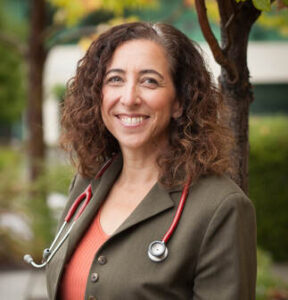Community Spotlight: Deirdre Bernard-Pearl, MD, Santa Rosa Community Clinics

Dr. Deirdre Bernard-Pearl has been practicing Primary Care Pediatrics since 1997 and is the Pediatric Faculty member of the UCSF-Sutter Santa Rosa Family Medicine Residency and Santa Rosa Community Health. She shared her experiences incorporating trauma-informed principles to promote worker wellness at her health center in a past ACEs Aware webinar.
1. What inspired you to introduce ACE screening and trauma-informed care in your practice?
I was inspired to introduce ACE screening and trauma-informed care about ten years ago when I found out about the original ACEs study and the association between child trauma and mental as well as physical health problems. I thought, “Hey, we should be asking these questions in the clinic.” Not asking them would be like not taking a family history or finding out if my patients smoke. It is essential health information.
2. Describe why and how your clinic incorporated trauma-informed care principles to address workforce burnout and to promote staff resilience.
When we first rolled out the effort, we learned immediately that ACE screening can bring up our own histories as care teams hear people’s stories. So, we decided to “walk the talk” of incorporating trauma-informed principles, taking time to hold space for staff.
My health center was very fortunate to be chosen to participate in the California ACEs Learning and Quality Improvement Collaborative (CALQIC). A key learning came from Dr. Alicia Lieberman, a UCSF Psychology professor who specializes in treating and healing from child abuse. She taught us that trauma happens in the context of relationships, and healing happens in relationships, too. More than ever, in the context of ACEs screening, we must bring our humanity into our exam rooms and our work rooms.
An ongoing learning collaborative at Santa Rosa Community Health is the Resilient Beginnings Network (RBN), in which our “New Beginnings” team participates. New Beginnings was started by my colleague, Dr. Erin Lund, and supports pregnant women and new moms who use substances and have very complex histories. We use pregnancy and early motherhood to help them stop or manage their substance use and address their social health needs. The RBN grant gave them the chance to dive into trauma-informed care and staff resilience and well-being.
The RBN grant and others, our internal ACEs workgroup, and even our organizational strategic planning process that we completed in mid-2021 highlighted that we have more work to do in this area, to which we are committed. Recovering from COVID only added to the stress load from which will take more time to completely heal.
3. What types of impacts have you seen in terms of burnout and wellness in your clinic?
I think it’s been especially hard everywhere in health care dealing with COVID — the danger of being on the front lines, the politicization of public health, the injustice and systemic racism that we all continue to see, and, of course, the grief and loss. At a time when we were needing to come together, we had to prioritize safety and, as we know, that meant social distancing.
At the organizational level, like so many organizations, we have seen higher levels of turnover, people deciding to do something different, and very high challenges with recruiting.
4. Looking to the future, do you see any opportunities for more systemic changes taking place across the health care landscape?
Healing happens when we practice medicine without judging our patients — when we get to know them more fully — including if there were awful things that happened to them. When patients feel respected and not blamed, they engage in care. For many of the staff, ACE screening has been very meaningful.
Trauma-informed care — knowing our patients fully, believing our patients, and never judging them for what may have happened to them — is how we get back to the heart and humanity of medicine. This is the future of medicine.
Dr. Bernard-Pearl is a graduate of Stanford University School of Medicine and Pediatrics Internship and Residency at Children’s Hospital Oakland (now called UCSF Benioff Children’s Hospital Oakland). In addition to her positions at UCSF-Sutter Santa Rosa and Santa Rosa Community Health, she also serves as the American Academy of Pediatrics Community Access to Child Health (CATCH) District Facilitator for California.